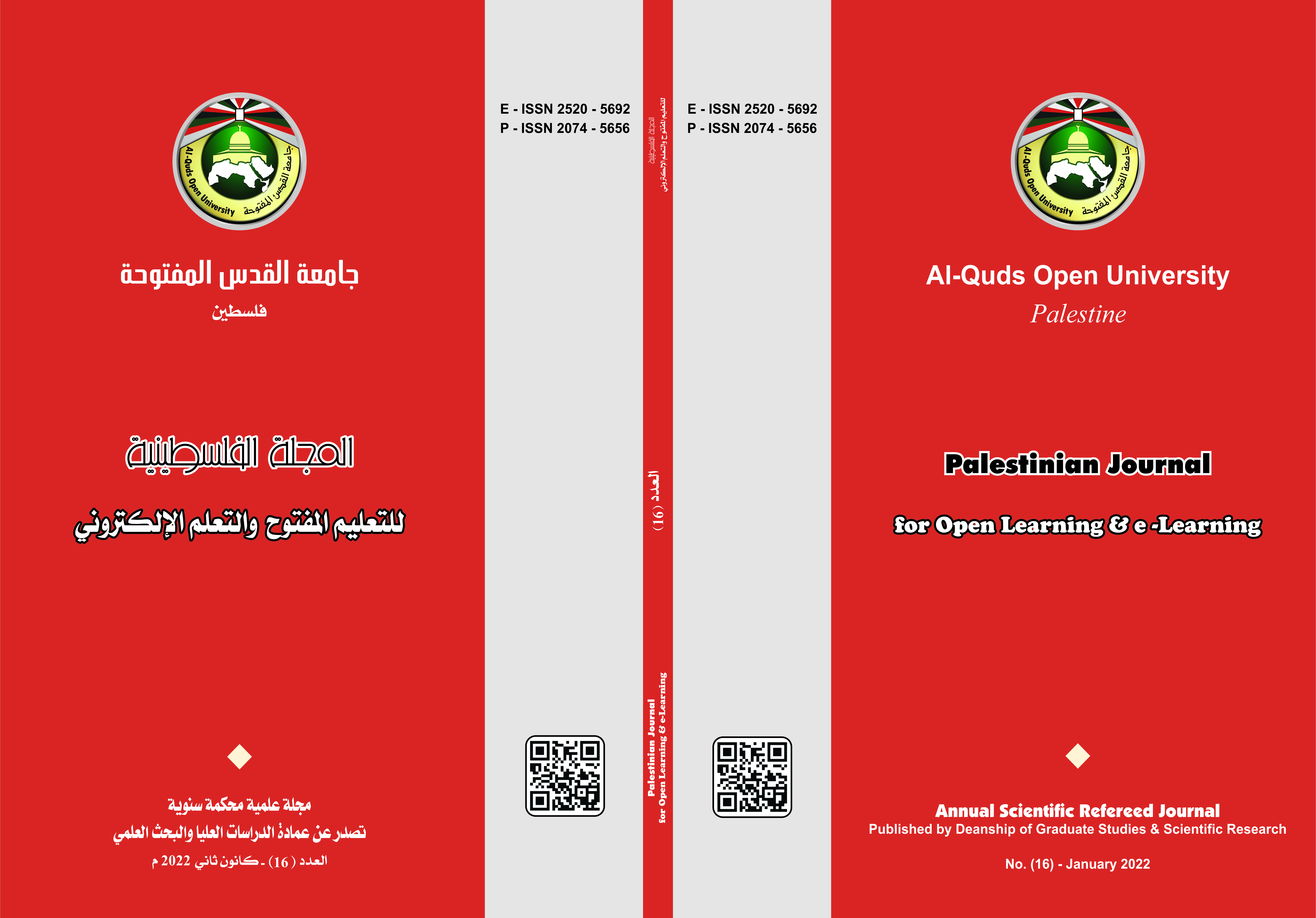مدى تقبل أعضاء الهيئة التدريسية في كلية الاقتصاد والأعمال في مؤسسات التعليم العالي الفلسطينية لاستخدام المساقات المفتوحة المصادر عبر (الانترنت) في عملية التدريس (جامعة فلسطين التقنية خضوري نموذجاً)
DOI:
https://doi.org/10.33977/0280-010-016-011الكلمات المفتاحية:
المساقات المفتوحة المصدر عبر (الانترنت)، مؤسسات التعليم العالي الفلسطينية، مدى التقبل.الملخص
هدفت الدراسة إلى تحديد اتجاهات أعضاء الهيئة التدريسية في كلية الأعمال والاقتصاد في جامعة فلسطين التقنية نحو استخدام المساقات المفتوحة عبر (الإنترنت) في العملية التعليمية. تم استخدام المنهج الوصفي التحليلي في هذه الدراسة؛ لأنه يصف العلاقة بين المتغيرات، ويحلل الدرجة التي تربط بين هذه المتغيرات. ولقد تكونت عينة الدراسة من (40) عضو هيئة تدريس بالكلية من أصل (43) عضواً. تم إعداد استبانة كأداة للدراسة، كما اختبرت الدراسة النظريات الصفرية التالية: لا يوجد فروق ذات دلالة احصائية في اتجاهات أعضاء الهيئة التدريسية نحو استخدام المساقات المفتوحة عبر الإنترنت في العملية التعليمية تعزى لمتغيرات: النوع، وسنوات الخبرة، والتخصص، والمستوى الأكاديمي. وقد خلصت الدراسة إلى استنتاج أهمية المواد المفتوحة عبر (الإنترنت) في تعزيز فهم الطلبة وتفاعلهم مع المواد التي يدرسونها عن طريق الانخراط مع طلبة ومدرسين من شتى أنحاء العالم. يضاف إلى ذلك قدرتهم على حضور محاضرات إلكترونية دون الحاجة للتوجه لجامعاتهم، الأمر الذي تحتاجه المعاهد والمؤسسات التعليمية بشدة نظراً للظروف السياسية والوبائية (أزمة كورونا في العالم). أوصى الباحثون توصيات عدة تتلخص في ضرورة تضمين المساقات المفتوحة المصدر عبر (الإنترنت) في العملية التعليمية التعلميّة في المؤسسات الأكاديمية؛ نظراً لأهميتها في خدمة الوضع الفلسطيني بشكل خاص: أكاديمياً وسياسياً واقتصادياً.
المراجع
References
Alamri, M., Almaiah, M., & Al-Rahmi, W. (2020). The Role of Compatibility and Task-Technology Fit (TTF) On Social Networking Applications (SNAs) Usage as Sustainability in Higher Education. IEEE Access . 8, 161668–161681.
Alam, M. M., Ahmad, N., Naveed, Q. N., Patel, A., Abohashrh, M., & Khaleel, M. A. (2021). E-learning services to achieve sustainable learning and academic performance: An empirical study. Sustainability, 13(5), 2653.
Albo, L., & Hernández-Leo, D. (2020). Conceptualising a visual representation model for MOOC-based blended learning designs. Australasian Journal of Educational Technology, 36(4), 1-26.
Amsal, A. A., Putri, S. L., Rahadi, F., & Fitri, M. E. Y. (2021, February). Perceived Satisfaction and Perceived Usefulness of E-Learning: The Role of Interactive Learning and Social Influence. In Proceedings of the 3rd International Conference on Educational Development and Quality Assurance (ICED-QA 2020), Padang, Indonesia (pp. 535-541).
Andreasen, et al.: Learning Potentials and Educational Challenges of Massive Open Online Courses (MOOCs) in Lifelong Learning. (2018), Vol.64, Issue 2, pp 151-160.
Askeroth, J. H., & Richardson, J. C. (2019). Instructor Perceptions of Quality Learning in MOOCs They Teach. Online Learning, 23(4), 135-159.
Baggaley, John, Bridging Fields at a Critical Time, Journal of Learning for Development, (2014), Vol1.
Beltrán, H. d., Romero-Rodríguez, L., & Ramirez, M. M. (2019). Entrepreneurship competencies in energy sustainability MOOCs. J. Entrep. Emerg. Econ, 11, 598–616.
Calvo, S., Lyon, F., Morales, A., & Wade, J. ( 2020). Educating at scale for sustainable development and social enterprise growth. The impact of online learning and a massive open online course (MOOC). , 12, 3247.
Castiblanco Jimenez, I. A., Cepeda García, L. C., Violante, M. G., Marcolin, F., & Vezzetti, E. (2021). Commonly Used External TAM Variables in e-Learning, Agriculture and Virtual Reality Applications. Future Internet, 13(1), 7.
Chopra, G., Madan, P., Jaisingh, P., & Bhaskar, P. (2019). Effectiveness of e-learning portal from students’ perspective: A structural equation model (SEM) approach. Interactive Technology and Smart Education.
Di Vaio, A., Boccia, F., Landriani, L., & Palladino, R. (2020). Artificial intelligence in the agri-food system: Rethinking sustainable business models in the COVID-19 scenario. Sustainability, 12(12), 4851.
Guerrero, M., Heaton, S., & Urbano, D. (2021). Building universities’ entrepreneurial capabilities in the digital era: The role and impacts of Massive Open Online Courses (MOOCs). Technovation, 99, 102139.
Gupta, S. B., & Gupta, M. (2020). Technology and E-learning in higher education. Technology, 29(4), 1320-1325.
Haas, et al., Automating a Massive Online Course with Cluster Computing, International Journal of Distance Education Technologies, 2016, Vol1, no.2, pp. 30-48.
http://www. The Complete University Guide. Co. UK /distance- learning /moocs -(massive-open-online-courses).
Julia, K., & Marco, K. (2021). Educational scalability in MOOCs: Analysing instructional designs to find best practices. Computers & Education, 161, 104054.
Jung, E., Kim, D., Yoon, M., Park, S., & Oakley, B. (2019). The influence of instructional design on learner control, sense of achievement, and perceived effectiveness in a supersize MOOC course. Computers & Education, 128, 377-388.
Kizilcec, R. F., Pérez-Sanagustín, M., & Maldonado, J. J. (2017). Self-regulated learning strategies predict learner behavior and goal attainment in Massive Open Online Courses. Computers & education, . 104, 18-33.
Li, C. M., He, L. M., & Wong, Ip. A. (2021). Determinants predicting undergraduates’ intention to adopt e-learning for studying english in chinese higher education context: A structural equation modelling approach. Education and Information Technologies, 1-19.
Mailizar, M., Burg, D., & Maulina, S. (2021). Examining university students’ behavioural intention to use e-learning during the COVID-19 pandemic: An extended TAM model. Education and Information Technologies, 1-21.
McAndrew,Patrick. (2011), Inspiring creativity in organisations, teachers and learners through Open Educational Resources. 141,148. Translated by Dr. Insaf Abbas.
Ramahi, Hanan: Education in Palestine: Current Challenges and Emancipatory Alternatives. ( Nov.2015).
Shah, D. (2019). By The Numbers, MOOCS in 2017, Class Central, 2018. 4, 17.
Ullah, N., Mugahed Al-Rahmi, W., Alzahrani, A. I., Alfarraj, O., & Alblehai, F. M. (2021). Blockchain Technology Adoption in Smart Learning Environments. Sustainability, 13(4), 1801.
Voss, B. (2013). Massive Open Online Courses (MOOCs). A Primer for University and College Board Members, AGB Association of Governing..
التنزيلات
منشور
كيفية الاقتباس
الرخصة
- الالتزام التام بأخلاقيات البحث العلمي.
- الالتزام التام بحقوق الملكية الفكرية.
- حقوق الطبع والنشر تؤول للمجلة.
- الحصول على موافقة المجلة لإعادة نشر البحوث أو ترجمتها.
- الالتزام التام بتعليمات هيئة تحرير المجلة.







2.png)






_2.png)

